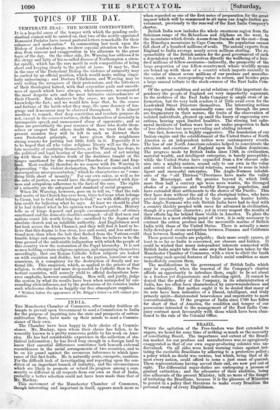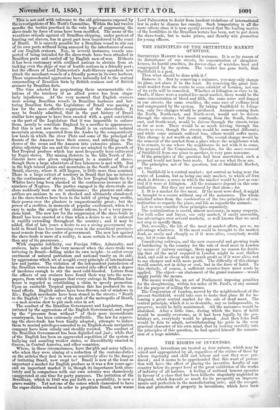BRAZIL.
WHEN the agitation of the Free-traders was first extended to sugars, we heard for some time of nothing so much as the necessity of conciliating Brazil. The importance and extent of the Brazil- ian market for our produce and manufactures was as egregiously exaggerated as that of our own sugar-producing colonies was un.- dervalued. On all sides were heard warning voices against irri- tating the excitable Brazilians by adhering to a protective policy; a policy which no doubt was unwise, but which, being that of al- most every nation, could afford to none a jest cause of quarrel. These representations having served their end, are now put out of sight. The differential sugar-duties are undergoing a process of gradual extinction ; and the advocates of their abolition, being also adherents of the present Ministry, talk no more of the danger of irritating the Brazilians, because it is the pleasure of Ministers to persist in a policy that ihreatens to make every Brazilian the personal enemy of every Englishman.
This is not said with reference to the old grievances exposed by the investigations of Mr. Hutt's Committee. Within the last twelve months the tactics practised in the vain hope of suppressing the slave-trade by force of arms have been modified- The scene of the vexations crusade against all Brazilian shipping, under pretext of hunting out slavers, has in great part been transferred to the coast of Brazil. It is scarcely possible for a Brazilian vessel to stir out of its own ports without being annoyed by the interference of some of our English cruisers. Nay, in several instances, vessels sus- pected of being intended for the slave-trade have been attacked in Brazilian ports and carried off by English men-of-war. Hitherto it has been customary with civilized nations to abstain from at- tacking even the ships of war of hostile nations in a friendly port; but the officers of Lord Palmerston's Anti-Slavery squadron now
attack the merchant-vessels of a friendly power in its own harbour. These unprecedented aggressions have naturally led to the mutual cannonading of Brazilian forts by -British cruisers and of British cruisers by Brazilian forts.
The time selected for perpetrating these unwarrantable via lations of the territory of an allied power has been singu-
larly injudicious. At the very. moment that English cruisers
were seizing Brazilian vessels in Brazilian harbours and bat- tering Brazilian forts, the Legislature of Brazil was passing a law for the more- effective suppression of the slave-trade. It may be frankly admitted, that in the past history of Brazil similar laws appear to have been enacted with a quiet conviction on the part of the Legislature that it was impossible to enforce them, merely to conciliate England by a sacrifice to appearances. But this is not now the ease. Brazil is an extensive isolated mountain system, separated from the Andes by the comparatively low lands in which the river Plate and some of the principal d- iluents of the Amazon have their source, and subsiding on the shores of the ocean and the Amazon into extensive plains. The plains adjoining the sea and the river are adapted to the growth of that Tropical produce which has most frequently been cultivated by Negro slaves. The mining districts in the hills North of Rio
Taneiro have also given employment to a. number of slaves, though there a large admixture of free labourers is met with. But
in the high inland plains and mountains in the South and West of
Brazil, slavery,,where it still lingers, is little more than nominal. There is a large extent of territory, in Brazil that has no interest
in the continuance of slavery. In the low Tropical lands the few Whites have long been alarmed at the continuous increase in the numbers of Negroes. The parties engaged in the slave-trade are alone recklessly bent on its continuance ; the planters and other settlers are anxious to see it ehecked and ultimately abandoned- As the slave-traders have been in the habit of giving long credits, their power over the planters is unquestionably great ; but the
power of a creditor, in moments of popular excitement, when it is easy to make the origin of his, claims odious, is of a very preca-
rious kind. The new law for the suppression of the slave-trade in Brazil has been enacted at a, time when a desire to see it enforced is rapidly extending throughout the country ; and it may be added, that of late years a desire to see a strong government up- held in Brazil has been increasing even in the anarchical provinces most remote from the centre of government. The new law against the slave-trade is more of a reality, is more certain to be enforced, than any of its precursors. . With singular infelicity, our Foreign Office, Admiralty, and cruisers, have seized the very moment when the slave-trade was tottering in Brazil—falling under its own weight—to enlist every sentiment of natural patriotism and national vanity on its side, by aggressions which set at nought every principle of international law and justice. The violation of the independent jurisdiction of the Brazilian waters has also been carried into effect with a degree of insolence enough to stir the most cold-blooded. Letters from the officers of our cruisers have found their way into the news- papers, from which it appears that every outrage in Brazilian har- bours is regarded as establishing a claim to speedy promotion.
Upon an excitable Tropical 'illation this has produced its na- tural effects. English sailors ye been thrown out of windows in Rio ; Paglish merchants have been stoned in the streets ; " Death to the -English I " is the cry of the mob of the metropolis of Brazil, —a mob nowise slow to put such cries in act.
The conduct of the Brazilian Government and Legislature, thus irritated by the aggressions of the English Government, and urged by the "pressure from without" of their more inconsiderate countrymen, has been extremely creditable. The law for repress- ing the slave-trade has been finally adopted; attempts to induce them_ to rescind privileges conceded to an English steam navigation company have been calmly and steadily resisted. The conduct of the Brazilian Government has been dignified and just ; while that of the English has been an aggravated repetition of the system of bullying and assailing weaker states, so discreditably enacted in Greece, in Central America, and other countries. Where, in these circumstances, have thorglib and noisy talkers, who when they were aiming at a reduction of the customs-duties on the articles they deal in were so sensitively alive to the danger of irritating Brazil, now crept to ? Brazil is now at the least as important a market for English produce as it was a few years ago: and an important market it is, though its importance 'both abso- lutely and in comparison with our own colonies was shamelessly exaggerated at one time for party purposes. The irritation of the Brazilians, which in 1845 was put forth as a possibility, is now a grave reality. Yet not one of the voices which clamoured to have the sugar-duties reduced in order to propitiate Brazil, now warns Lord Palmerston to desist from insolent violations of international law in order to disarm her enmity. Such temporizin,g is all the more odious since it is now openly avowed that the leading motive of the hostilities in the Brazilian waters has been, not to put down the slave-trade, but to make prizes, and thereby win promotion for young officers.



























 Previous page
Previous page